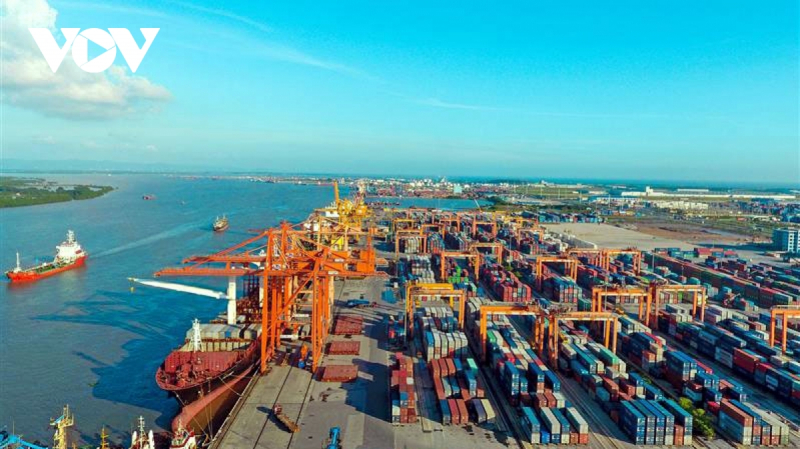Logistics connectivity through e-commerce eases difficulties for firms amid COVID-19
The domestic logistics industry is in the process of shifting, with over 50% of contracts now linked to the abrupt growth of e-commerce in order to serve the domestic consumption market share.

Since the start of the year amid increasingly complicated developments relating to the spread of the pandemic, logistical costs have continued to escalate, thereby causing plenty of difficulties for numerous enterprises who are doing their utmost to cope with and maintain production activities throughout the challenging period.
Most notably, logistics costs remain an important component for the competitiveness of exported goods.
Currently, the impact of the COVID-19 pandemic is causing significant congestion at ports, especially in Europe and North America. This has led to a scarcity of space on ships, as well as a shortage of vehicles, thereby driving up freight rates and logistical costs and adversely impacting businesses.
Pham Thi Bich Hue, chairman of the Board of Directors of Western Pacific Joint Stock Company, said that at present it can be considered a success if enterprises are able to order one container due to all fleets are being dominated by foreign multinational corporations.
Furthermore, the nation has yet to engage in in the international fleet market, causing an increase in total logistics costs relating to transportation as charges are very high. As long as a country or a government intervenes in the fleet, then the market share of Vietnamese goods will face many difficulties, Hue analysed.
"Booking fees can increase 1,000% after only one night (more than 10 times), thus affecting business contracts with partners and breaking all previous plans and negotiations. Therefore, it is difficult for logistics enterprises to come up with great strategies and sign long-term contracts with partners like before. Fore the reason, businesses should carefully explore the market and adapt themselves to reality," Hue said.
According to Dao Trong Khoa, vice chairman of the Vietnam Logistics Association (VLA), despite local logistics costs improving significantly over recent years compared to previous years, they can still be considered as quite high compared to other regional countries.
Specifically, logistics currently make up between 16.8% and 17% of the costs of firms, higher than Thailand at 15%, and Singapore at 8.5%, whilst making up 50% of transportation costs, Khoa stated.
Logistics associated with digital transformation and e-commerce
Many experts believe that reducing logistics costs in the current context remains an essential but challenging problem for the majority of businesses operating in this field. Therefore, digitisation can be viewed as a necessary element for the time being, especially for logistics enterprises that do not want to be left behind.
Do Xuan Minh, director of SNP Logistics, said that recently, the Center has invested in applying a modern logistics service management system, thereby combining the deployment of many warehouse management systems in order to serve the diverse needs of customers.
“The application of IT solutions in logistics service management brings optimal efficiency, with 100% of orders from customers being well managed thus minimizing individual errors, evaluate honestly and effectively the capacity of each individual in the service chain,” Minh explained.
This sudden growth of e-commerce therefore represents both an opportunity and a challenge as it poses a range of problems. This includes the speed of technological innovation, capital, and investment costs for the development of logistics centres, along with e-commerce centres, according to Pham Thi Bich Hue, chairman of the Board of Directors of Western Pacific Joint Stock Company.
Moreover, emerging logistics and e-commerce hubs all require specific land locations in order to form essential infrastructure for the industry. In the event that logistics and e-commerce firms can link together to give recommendations to the Government to access synchronous planning from the beginning, then the domestic logistics industry can develop faster than foreign multinational corporations. This is largely because there have been a range of remarkable improvements in dealing with legal procedures regarding land access and resources, Hue added.

